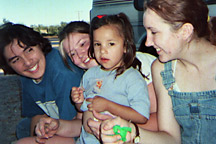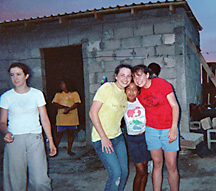Pullman teens touch lives of families on house-building trip to Mexico
By Mark Baetzhold
For six of eight youth from Sacred Heart Church in Pullman who participated in a two-week summer mission trip to Agua Prieta, Mexico, it was their first experience in a developing country.
 |
| Pullman youth meet Mexican youth. |
Rachel Brown and Elizabeth Dutton had participated in the 2002 mission trip. It was youth director June Brown’s fourth trip.
Elizabeth has learned that “no matter what people look like, no matter where they are from, no matter where they live, no matter what language they speak, they are all brothers and sisters.”
Having been there before, she was less shocked by what she saw this time.
“No matter how many times you see poverty, however, you are changed,” Elizabeth said. “I’ve been transformed on many different levels, ranging from simple things such as taking shorter showers in an attempt to conserve water to having my faith and love strengthened to having even more compassion to get out there and help what little I can.
“Not only was I affected by the people of Mexico, but also I was blessed to be part of the community of teenagers and adults in the youth group. We formed a tight bond.”
Other youth going were Claire Dutton, Andy Hughes, Cecil Jones, Alex Marcelo, Liz Paul and Kathleen Sutherland.
Mark Baetzhold, an Eastern Washington master’s degree student who has been working with The Fig Tree and who has seen poverty in work at House of Charity in Spokane, accompanied a Pullman group on a summer mission trip. Marcia Gonora and Tara Young-Brown were the two other chaperones.
Agua Prieta is a city of about 200,000 in the Sonoran Desert on the U.S.-Mexican border. On any day, a “floating population” of 50,000 people waits for the opportunity to cross.
Because that border between Agua Prieta and Douglas, Ariz., is a popular port of entry for undocumented immigrants, the United States in 1998 built a five-mile metal fence with stadium-sized lights that shine on it from the American side and give the border the appearance of a military state, Mark said.
“We crossed the border into Agua Prieta at night, and the environment changed dramatically and instantly,” Mark said. “We noted the absence of adequate infrastructure. Children and dogs wandered on unpaved streets. One-room cinderblock homes struck me immediately.
“I have worked with the rural poor in Appalachia and the homeless in Spokane, but the poverty in this community was like nothing I have experienced. I had expected it would be a more developed, wealthier region because of its proximity to the U.S. border.”
 |
| Pullman youth build Mexican house. |
Tara, who is campus minister at Newman Center at Eastern Washington University in Cheney, said that “the border towns have some of the worst poverty in Mexico.”
She explained that migrants from Mexico and other Latin American countries travel to border towns seeking work in American- and European-owned plants, or they try to cross the border, seeking greater economic opportunity.
However, plants are closing down to relocate overseas, and crossing the border is increasingly difficult with U.S. surveillance.
As a result, a significant percentage of the population is unemployed and confined to makeshift informal housing in industrial neighborhoods on the outer edges of the city, Tara said.
The group resided for eight days in Agua Prieta at the Divine Providence Ranch, a program of the Rancho Feliz Charitable Foundation, established in 1987 by Troy and Gil Gillenwater.
Gil, a real estate broker in Scottsdale, Ariz., felt compelled to act on behalf of the most vulnerable after witnessing the extreme poverty of Agua Prieta. Initially formed to assist abandoned children in the border towns, Rancho Feliz strives to provide American volunteer groups with the opportunity to grow through serving the less fortunate.
“Service provides us unbounded possibility. Our lives start going better, there’s somehow more quality, more meaning, more purpose and more joy,” Gil said. “There is a greater sense of community, and we realize that we live in a world of abundance and that there is enough for all of us.”
In addition to accommodations for volunteers, the ranch hosts seniors and orphans in separate facilities. The proximity to the orphanage and nursing home allowed the volunteers to interact freely with children and seniors.
The youth group from Sacred Heart Catholic Church in Pullman spent time visiting, playing guitar and singing songs, dancing and serving meals at the nursing home. At the orphanage they played with the children, read stories and worked on crafts.
One afternoon, the group prepared hamburgers and salad for seniors, children and some ranch staff, ending the evening with a piñata ceremony.
The youth also engaged in projects outside the ranch.
During the week, they awoke around 4:30 a.m. to be at work sites by 6 a.m. Because temperatures rose to 100 degrees or more, most workdays ended by 1 p.m.
They spent two days scraping, washing and painting walls of an elementary school.
For three days, they helped a family construct a one-story cement-brick house. The first day, they mixed cement and laid the concrete floor. The second day, they added several layers of bricks.The third day, they put on a tin roof.
During breaks, the Pullman group also played tic-tac-toe and other games in the dirt with the family’s four children and had a “water war” the last day.
Despite difficulties of communicating in different languages, the volunteers and the family formed bonds of playfulness, respect and friendship, Mark observed.
On the last day, the group toured a U.S.-owned factory that produces microphone and communication parts. It was clean and well run, like U.S. factory conditions, but the factory workers earn the equivalent of $12 a day.
“We learned that the factory would close next year to relocate to China, where the company will utilize cheaper labor and less-regulated environmental standards,” Mark said.
Another educational experience occurred when the group split into two “families” to shop for dinner at a local grocery store. Each group was given 40 pesos (about $4)—what a typical Mexican family might spend on dinner.
The groups could afford only basic foods such as beans, rice, eggs and inexpensive fruits and vegetables. Back at the ranch, the youth decided to combine what they had and share their meals.
“The experience deepened our awareness of the realities poor people throughout the world experience daily,” Mark said.
The youth left Agua Prieta strengthened in their commitment to serve people in need and with a new awareness of issues of social justice, he said.
“In addition, we will remember the God-given bonds of friendship formed with the people of Mexico and with one another,” Mark said.
For information, call 332-4402.
Copyright © October 2004 - The Fig Tree




